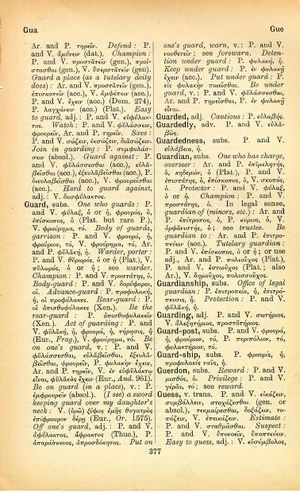guardian: Difference between revisions
From LSJ
κατ' ἀρχῆς γὰρ φιλαίτιος λεώς → people are always ready to blame the rulers, people are against authority, people were fond of anything by which they could call authority in question
(CSV4) |
m (Woodhouse1 replacement) |
||
| Line 1: | Line 1: | ||
{{Woodhouse1 | {{Woodhouse1 | ||
|Text=[[File:woodhouse_377.jpg|thumb|link={{filepath:woodhouse_377.jpg}}]] | |Text=[[File:woodhouse_377.jpg|thumb|link={{filepath:woodhouse_377.jpg}}]] | ||
===substantive=== | |||
[[one who has charge]], [[overseer]]: [[Aristophanes|Ar.]] and [[prose|P.]] [[ἐπιμελητής]], ὁ, [[κηδεμών]], ὁ ([[Plato]]), [[prose|P.]] and [[verse|V.]] [[ἐπιστάτης]], ὁ, [[ἐπίσκοπος]], ὁ, [[verse|V.]] [[σκοπός]], ὁ. | |||
[[protector]]: [[prose|P.]] and [[verse|V.]] [[φύλαξ]], ὁ or ἡ. | |||
[[champion]]: [[prose|P.]] and [[verse|V.]] [[προστάτης]], ὁ. | |||
[[in legal sense]], [[guardian of]] ([[minors]], etc.): [[Aristophanes|Ar.]] and [[prose|P.]] [[ἐπίτροπος]], ὁ, [[prose|P.]] [[κύριος]], ὁ, [[verse|V.]] [[ὀρφανιστής]], ὁ; see [[trustee]]. | |||
[[be guardian to]]: [[Aristophanes|Ar.]] and [[prose|P.]] [[ἐπιτροπεύειν]] (acc.). | |||
[[tutelary guardian]]: [[prose|P.]] and [[verse|V.]] [[ἐπίσκοπος]], ὁ or ἡ; or use adj., [[Aristophanes|Ar.]] and [[prose|P.]] [[πολιοῦχος]] ([[Plato]]), [[prose|P.]] and [[verse|V.]] [[ἑστιοῦχος]] ([[Plato]]; also [[Aristophanes|Ar.]]), [[verse|V.]] [[δημοῦχος]], [[πολισσοῦχος]]. | |||
}} | }} | ||
Revision as of 08:51, 20 May 2020
English > Greek (Woodhouse)
substantive
one who has charge, overseer: Ar. and P. ἐπιμελητής, ὁ, κηδεμών, ὁ (Plato), P. and V. ἐπιστάτης, ὁ, ἐπίσκοπος, ὁ, V. σκοπός, ὁ.
protector: P. and V. φύλαξ, ὁ or ἡ.
champion: P. and V. προστάτης, ὁ.
in legal sense, guardian of (minors, etc.): Ar. and P. ἐπίτροπος, ὁ, P. κύριος, ὁ, V. ὀρφανιστής, ὁ; see trustee.
be guardian to: Ar. and P. ἐπιτροπεύειν (acc.).
tutelary guardian: P. and V. ἐπίσκοπος, ὁ or ἡ; or use adj., Ar. and P. πολιοῦχος (Plato), P. and V. ἑστιοῦχος (Plato; also Ar.), V. δημοῦχος, πολισσοῦχος.

